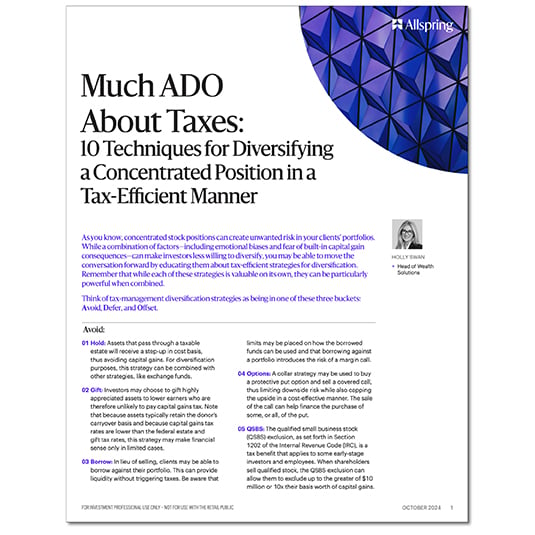Capabilities
Tax Management and Estate Planning
Meet Holly Swan, Allspring’s expert on tax-aware investments and estate planning concepts. As a resource to financial advisors, Holly creates materials and educates on a variety of topics, providing generational guidance to help navigate tax challenges and planning goals.

Allspring Wealth Solutions
Expert tax and estate planning capabilities
Thought leadership
Simplifying income tax strategies, estate planning concepts, and equity-based incentive compensation.
Education
Targeting estate planning and tax reform with practice management advice.
1:1 Coaching
Engaging on liquidity events, concentrated stock, executive compensation, advanced transfer planning, and family office positioning.
Income Insights: income tax concepts
Podcast: Tax Talk: Seek to Save More
Holly Swan, head of Wealth Solutions, and Tony Svach, head of Intermediary Sales, explore key topics that advisors and clients are engaging on, focusing on strategies to help optimize after-tax outcomes.
Transcript
Tony Svach: Hi, I'm Tony Svach, head of Intermediary Sales at Allspring, and welcome to SpringTalk. Today, joining me is Holly Swan, our in-house expert in taxes and head of Wealth Solutions. And she's part of the Global Client Strategy team. Holly, thanks so much for joining me today.
Holly Swan: Thanks for having me, Tony.
Tony: So, it is April in Chicago. That means a little less snow, means a little more rain, some flowers on the horizon, the Masters, baseball, all kinds of happy stuff. And then, a call from my tax preparer and they walk me through my tax filing for the year. And not so much fun. Not the best part of April. So, as we look at 2025, 2024 is in the books, but we're sitting in the middle of the year, only April. What can advisors do on behalf of clients today to help them with their tax situation as they think about 2025?
Holly: Right. You know, the thing about taxes is that paying is inevitable, but overpaying is optional. So, as we look at our 2024 taxes—which I know a lot of us are filing extensions, but that's an extension of time to file, not an extension of time to pay, so we're all paying this week—first, I think an easy thing to do is to review our estimated tax payments for the upcoming year to make sure that we are not going to be paying penalties going forward. That's a really easy way to avoid paying in money that we don't need to pay. And of course, we don't want to overpay those estimates because that's making an interest-free loan to the government. But we don't want to underpay and get hit with the penalty. We want to look at the timing of our income. There are some forms of income that we can control the timing of, like the exercising of options. So, look at your income for the coming year, project out for the next year, and to the extent that you have options to exercise, think about whether you're better off exercising them this year or waiting. Look at some of your options for reducing your income, like optimizing your retirement funding or charitable giving strategies. And I really like to encourage people to look at their charitable giving strategies now. So many people wait until year end and they really think of December as giving season. And charities promote December as giving season. December is the worst time of year to give, in my opinion. First, we feel tapped out because of the holidays. But also, if you want to really make an impact from a tax perspective giving plan like giving with appreciated stock instead of cash, waiting until the last week of the year is not the time to do that. So, look at doing that now. Also, talk to your clients about implementing tax-efficient investment strategies in their portfolios. Lots of ways for advisors to help their clients to get that tax number down to really add tax alpha for them. It’s a great way to also take a look at their outside accounts and say, hey, here's where I could add tax alpha if you brought those assets over. And also, review those AMT (alternative minimum tax) preference items. I know a lot fewer people are getting hit with AMT right now, but particularly things like ISO (Incentive stock options) exercises, take a look at those and see if there are ways to get people who are paying AMT out of the AMT.
Tony: Yeah. So, a lot of it is just thinking ahead, helping the client refocus and say, as we have some time in the year, let's think about charitable donations. Let's think about the tax payments we're making ahead of time to not have that penalty. So, just really not wait until the end of the year to think about taxes or April 14.
Holly: Or wait until April. So many people wait until April. And like, that ship has sailed.
Tony: Right, right. It makes total sense. So, you touched a little bit on investments—some ideas to think about there. When you think about tax-efficient investments, what are some things that advisors should be putting their minds to around that opportunity?
Holly: Sure, there are some really easy ones and some more complex ones. So, let's start with the really easy ones. Improved asset location: so, taking a look at your clients’ assets and making sure they're holding them in the right account. So, I met with an advisor last week who was like, hey, what do I do about my clients who are getting all of these capital gain distributions in their taxable accounts for mutual funds? Mutual funds are not tax efficient. They should really be held in your clients' tax-deferred and tax-exempt accounts. We should really be looking at things like ETFs (exchange-traded funds) and SMAs (separately managed accounts) in clients’ taxable accounts. And so, for advisors who haven't already made that pivot, making that pivot. But also for advisors who have but have prospective clients who still have a component of their portfolio that's self-directed, saying, hey, let me take a look at that self-directed piece and make suggestions for how you can improve asset location within that, that's a great way for them to show the value of working with an advisor instead of being self-directed on that piece. Systematic tax loss harvesting: if there is one thing that the last couple of weeks have shown us, it's that waiting until December to harvest your losses, you can miss out on a lot of down-market opportunities, right? These past few weeks, there have been a lot of opportunities. And so, if you were just doing it in December, you missed out. And so, making sure that you're harvesting year-round, so that you can offset your gains and not just your gains from this year. First, if you have excess gains, you can use $3,000 of that to offset ordinary income, but you can also carry those losses forward to offset gains in future years. And so, if you have a client with a large, highly concentrated, highly appreciated position that they need to work their way out of, harvest big losses when these opportunities present themselves so that you can help them move away from those large, highly appreciated concentrations in a really tax-efficient way. Another one that I think a lot of advisors have been saying is how can I get my clients to start moving away from these money market funds that they really gravitated towards over the last couple of years and really understand that munis are giving them a better tax equivalent yield? Well, right now, when they're coming to you saying, hey, I'm really upset by the amount I just paid in taxes, sitting down and showing them the money market is yielding a lot, but here's what the tax equivalent yield would be if you had instead put this into munis, this is the perfect time to be having that conversation.
Tony: And just along those lines, too, I agree that one of the things that we talk about with clients all the time is the advisor has the gift today versus ten years ago even of choosing your wrapper and being thoughtful in that. And so, you've got your mutual fund, your ETF, your SMA. You can go with direct indexing or active but really being thoughtful and intention with those wrappers versus just having them come to you. And so, I think that's the next step in our evolution of serving clients—looking across their holdings and saying are these the wrappers of choice for these accounts or these clients that are optimal from a tax standpoint? And you're right. It's not something that's easy to talk about all year, but when it's hitting home right now, it's a visceral reaction to really talk about, there are returns and what the markets return, but what I care about is what you keep. And so, let's talk about taxes and location and actually like the net returns of a municipal investment of a tax-efficient wrapper because that's really what matters to the client.
Holly: Yeah. And so many clients just have it stuck in their mind, like, oh, mutual funds are the least expensive alternative. Or the money market is the inexpensive alternative. And they have this sort of legacy mindset of, I need to go for the least expensive alternative and this is what I was taught. And they haven't been keeping up with the times and understanding the tax ramifications of some of those wrappers that they were taught that they wanted and that the lowest cost alternative isn't necessarily what's going to give them the most value in the long run.
Tony: And I'm also surprise by when you talk to folks not in our industry, the lack of knowledge of an ETF. Like just because of the fact that we're in the industry with our advisors, we just make the assumption that, well, you've got mutual funds, ETFs, SMAs. We throw out acronyms all the time. But if you actually sit down at Thanksgiving and go around the table and ask people, do you know what the difference between an ETF and a fund is? It's not a pretty answer.
Holly: That's true. I mean, honestly, I've had some advisors say to me, can you explain the difference? So, I think that there is some demystification that needs to happen there. And so, when you throw separately managed accounts into that mix, that can really get confusing for people.
Tony: It really can. Really can. So, we have our current tax law that’s looking to sunset at the end of this year. So, if that were to happen, what does that look like for advisors and what should they be thinking about if that does occur?
Holly: Yeah. So first, I think the chances of that actually occurring are pretty slim. I think Trump has been pretty adamant about the fact that he doesn't want that to occur. But if it did—and I still think it's important that we level-set that with clients about what would happen—we would see an increase to income tax rates. The AMT exemption would decrease. We've seen way fewer clients get hit with the alternative minimum tax over the last few years since TCJA (Tax Cuts and Jobs Act) was enacted in 2017. The standard deduction would decrease. So, we used to see a lot of clients filing with itemized deductions. We've seen a big decrease in that because the standard deduction has gone way up. The standard deduction would go down and we’d go back to seeing more people as itemized filers. The SALT cap would go away. That's the $10,000 cap on state and local taxes. So, those are the big income tax things. From an estate tax perspective, the unified credit, which is currently $13.99 million, would essentially get cut in half, so around $7 million. So, from an estate planning perspective, that would be huge. So, we have seen a huge rush in the ultra-high net worth space of people running out to do planning just in case that were to happen.
Tony: Yeah. So, you have the benefit of just traveling the country, talking to folks about taxes, which I think sounds like fun. I don't know if everybody does, but it sounds like a good time. But in those conversations, what are some unique planning strategies that you think about and you consider once we know how tax reform moves? What are some things that you've run across or you think about that could benefit advisors?
Holly: Well, so first, when we see how tariffs play into tax reform—because tariffs are really an ever-changing, daily-changing moving target at this point—and when we see where we're going with that, what the stagflation situation could be, there's a lot of pressure on Powell from that perspective. But we could see real opportunities in rate fluctuations there. So, that, I think, is something for advisors to keep an eye on. If we see rates continue to stay low and the Republicans really are pushing for a long-term extension of TCJA—they're currently pushing for what they are calling a permanent extension of TCJA—but in the tax world, tax laws are either temporarily permanent or permanently temporary. But if we are to see that extension, it could go away at any moment if we see a change in administration. So, I think Roth conversions will be really appealing because if you look at low rates combined with where we are from a national debt perspective, no matter how permanent they make these rate cuts, rates are likely to go up at some point to help us pay the national debt down. And so, everyone keeping that in the back of their mind, Roth conversions, I think, are going to be really compelling. Also, when we see how these cuts pan out, let's look at the things that they're talking about. They're talking about a complete extension of TCJA. They're talking about some other Trump proposals like getting rid of the tax on tips, tax on overtime, potentially giving us a deduction on auto loans for domestically produced loans. There are some other things out there that we're not talking about as much. Project 2025, and I know that Trump has said that it's not a guideline for his administration, but I think if you look at the first few months of his administration, I think we can also say that it's not-not serving as a guideline. And Project 2025 does call for a reduction in the top capital gains rate to 15%. So, if we were to see something like that, I think there would be the potential for massive acceleration of capital gain recognition. And that would be interesting because that is a tax cut for the 1%. But it's also a way to massively accelerate tax revenue and potentially pay for a portion of tax reform. It's an opportunity.
Tony: Right. So, it seems like there are a lot of opportunities depending on where the pendulum swings to over the next couple of months and years. And so, then looking at some estate planning ideas, some of the different potential outcomes in tax law over the next couple of months, what are some trends that you see that maybe aren't front page that people should be thinking about, that they should really pay attention to that might be coming over the next 6 to 12 months that you see in your day-to-day time in the tax world, if you will?
Holly: Yeah. So, one thing that I think we're not talking about that worries me is unintended consequences of getting rid of the tax on tips. One thing that I worry about, first, I think we've got to be very careful about how something like that is written. Because I think there's the potential for a lot of people to start recategorizing their income as tips, but also, I worry about the long-term implications of people reporting lower income. For instance, all of these employees who currently get a lot of their income through tips—let's think about hospitality workers—what are the implications to their Social Security income over time? If Social Security is calculated based on their highest 35 years of earning and suddenly we're not counting tips in their earnings, right? So, things like that concern me. If we stop taxing overtime, I think that sounds great and let's incentivize people to work more and work harder, but then, are we suddenly needing fewer workers because the workers that we do have are working harder? Now maybe these things intersect with immigration policies also because we need more people to fill more jobs. But I think those are some things that we haven't started talking about yet that I do think we're going to need to start talking about. I also think that tax reform has been really overshadowed by tariffs in the news lately. And I do think, given where we are now, that we've officially entered the reconciliation process because the House has passed the budget resolution and we're going to find out more and more about how they are planning to pay for this. We're going to learn more about what their plans are with respect to Medicaid and Medicare. And so, I think what these plans are will become a lot more certain and will allow people to plan more. I do think there is a proposal out there right now to completely repeal the estate tax and to keep the step-up in basis. If you had asked me three weeks ago if that had legs, I would have told you that that was the craziest thing I had ever heard. And I have learned over the last few weeks to not discount any of these things, right? So, maybe I don't think it could be part of reconciliation because I don't know how we would pay for that. But what I would say is no matter how tax reform shakes out, estate planning will never go away because the human side of estate planning—how we want our wealth to shape our children and the issues that are unique to our families—those things will never go away. And from an income tax perspective, even if we do see lower rates for now, it’s never going to take away the sting of seeing that bottom line on our tax return. There's never going to come a time where we're like, oh, I'm super happy about that giant number I see there, right? That's never going to be the case. We're always still going to be like, oh, I wish I hadn't made eye contact with that number. We will always want that number to be lower and financial advisors will always be able to add value to their clients by showing how they are able to make that number lower. And that's by helping them avoid taxation, largely through asset location choices, helping them to defer that tax, and helping them to offset that tax through smart charitable giving strategies.
Tony: And I agree. I think there's so many layers to the estate planning and there's the emotional family dynamic of it and you see that more and more. As advisors gather their clients together, they spend almost as much time on the generational influence of wealth as they do the bottom line of what they're actually going to pass to the next generation.
Holly: I would say they spend more time. The emotional part really ends up taking more time because the tax mitigation strategies are what they are, right? But the dynamics of each family are so different and how they want their wealth to impact not just their kids, but, in some cases, three generations down. That is a lot for families to think through and that part is never going to change.
Tony: Agreed. I think the thread through everything that we've heard today is just the importance and the need for advice of clients—objective advice—that's helping them make the decision. Given all the different optionality folks have these days versus years past, it's more important than ever.
Holly: Yup, absolutely.
Tony: Well, Holly, thank you so much for your insights today. Really appreciate it. And I'd also like to thank our audience for joining us and we look forward to seeing you all next time on SpringTalk.
Swan Songs: estate planning concepts
Much ADO About Taxes
Educating clients on the many options for tax-efficient diversification can be a powerful step in gaining comfort with moving away from a concentrated position that may be adding unnecessary risk to portfolios.


While paying taxes is inevitable, overpaying is optional. We help advisors understand all of their clients’ opportunities for optimizing after-tax outcomes.
Holly Swan, Head of Wealth Solutions, Global Client Strategy

Allspring Global Investments does not provide accounting, legal, or tax advice or investment recommendations. Any tax or legal information on this page is merely a summary of our understanding and interpretations of some of the current income tax regulations and is not exhaustive. Investors should consult their tax advisor or legal counsel for advice and information concerning their particular situation.
